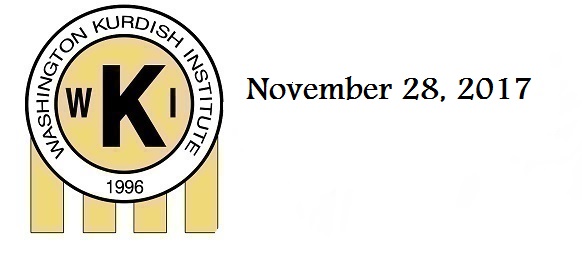1K
Iran
- The Kurdish population affected by the earthquake on November 12th continue to suffer from lack of provisions and aid by the Iranian regime. Hundreds of families remain homeless during the winter cold without proper aid. Further, the displaced families lack sufficient food, especially for children. The regime’s secret police have detained more Kurds who appeared on social media videos complaining about the government’s response to the earthquake.
Iraq
- The negotiations between the Kurdistan Regional Government (KRG) and Iraq’s central government have not started yet. After the Iraqi government called the KRG to annul the results of the referendum, KRG’s Prime Minister Nechirvan Barzani replied: “We said it before, too. We respected the decision of the Federal Court.” The KRG blamed Baghdad for not reopening the airport, and sending employees’ salaries. Internally the KRG has met the opposition parties of Gorran (Change) and Komala (Islamic Group) to form a unified delegation of the Kurdistan region if talks with Baghdad should start.
- A video report by Rudaw shows the destruction to the Kurdish homes in Tuz Khormato, south of Kirkuk, by the Iranian backed militias. The report shows that about 3,000 houses appear to have been confiscated while labeled by Shiite Turkmen slogans. The militias have looted 2,000 houses while tens of homes belonging to Kurdish families have been bombed. The Iraqi government have not commented on the action of their security forces that took place on October 16, 2017. Meanwhile Kirkuk city remains unstable due to military raids on Kurdish neighborhoods targeting members of Kurdish parties.
Syria
- The 8th round of Geneva peace talks over Syria is scheduled to start today in absence of Kurdish representation or officials from the Northern Syrian Federation. Due to Turkey’s protest, the UN sponsored talks will not include the Kurds. The Syrian opposition selected a chief negotiator and a large delegation to meet with the Syrian regime after meeting in Riyadh with Saudi officials. Meanwhile trilateral preparations between Iran, Russia, and Turkey are taking place to hold peace talks in February over Syria. So far rounds of Geneva and Astana peace talks have not result in ending the civil war in Syria after more than six years. In an interview, the Co-chair of the Executive Body in North Syrian Federation, Fawza Yousif said: “All the conferences and meetings that were held on the basis of solving the crisis in Syria did not provide any project that would serve the Syrian people and the basic issues, and that is why the crisis continues despite the passing of 7 years.”
- After a phone call between U.S. President Donald Trump and Turkey’s President Recep Tayyip Erdogan, the Turkish Foreign Minister said that Trump had promised Erdogan that the US will stop providing the Kurdish fighters of the People’s Defense Units (YPG) weapons. However, the White House described the move as “pending adjustments to the military support” and said, “We are progressing into a stabilization phase to ensure that ISIS cannot return.” Meanwhile the Pentagon spokesperson said they are reviewing adjustments to arm the YPG.
- The Turkish-backed Syrian groups with support of Turkey’s military continued shelling the Kurdish areas in Afrin. Recent attacks targeted Asofan village in the Sherawa district of Afrin. The Executive Committee of the Democratic Society Movement (TEV DEM) accused Iran and Russia of turning a blind eye to Turkey’s aggression against the Kurds in Afrin after their three way meeting at the Sochi resort in Russia. “We call upon all international and international forces and actors in the Syrian situation to take necessary measures against Turkish practices and threats against our people in Afrin,” read a statement by TEV DEM.
Turkey
- The Turkish police have launched a new wave of arrests against members of the opposition parties. In Bursa, the police raided houses and detained ten members of the Pro-Kurdish Peoples’ Democratic Party (HDP). The Turkish police also briefly detained an intellectual and public figure Fikret Başkaya for writing a piece about the Turkish government’s “terror” against the Kurdish population. In the Kurdish city of Diyarbakir (Amed), ten Kurdish politicians and activists were interrogated after two weeks arrest on charges of “memberships of terrorist organization,” which is the same charge against about ten thousand HDP members and lawmakers. In Ankara and Adana the police arrested several university students for their activism.
- 150 academics, intellectual, and researches will be prosecuted by the Turkish government on December 5, 2017. The 150 figures are accused of “terrorist propaganda” after a 2015 petition signed by 1,128 individuals asked the Turkish government to end the military campaign against the Kurdish population. The Turkish accusation against them could lead to 1-5 years of imprisonment.

